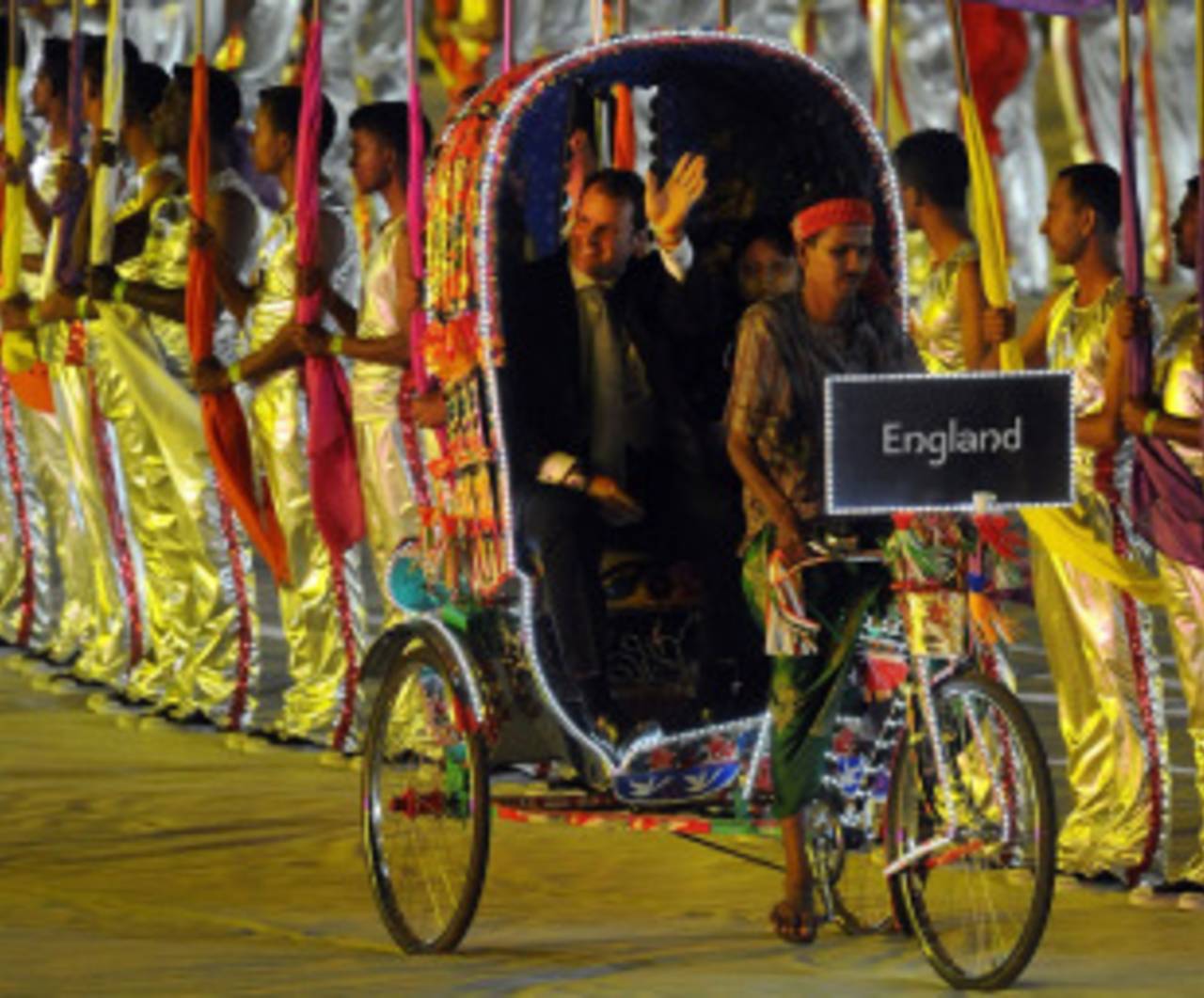Six out of ten for England
At least they weren't embarrassing
Mike Holmans
25-Feb-2013

England may not be welcomed back with quite the pomp they entered the tournament with, but they have no reason to hang their heads in shame • AFP
At least they weren't embarrassing. They arrive home as disappointed losers rather than hopeless chumps. There is no need to put bags over their heads and smuggle them out of the airport in an unmarked coach; cricket fans spotting them in the arrivals hall are more likely to smile sympathetically and mutter “bad luck” than to hurl abuse, as they might have at the national jokes which England's previous three World Cup parties became.
In their matches against India and South Africa, they showed that they belonged on the world stage; had the groups led on to a Super Eight stage, they would have carried forward more points than anyone else since they did not lose to a major team until the quarter-final.
However, the quarter-final was always the realistic limit of their ambitions. They may well have been weary after a long tour of Australia with no real break before the World Cup. They were certainly unlucky with the succession of injuries, which meant that they never had the same squad to choose from for consecutive matches.
But the bottom line is that England are poorly equipped for one-day cricket on subcontinent pitches.
They lack power hitters. They are generally nervous against spin, allowing themselves to be tied down by second-rank part-timers who should at least be milkable, even if they bowl tidily enough for whacking them out of the park to be too risky. And they don't really have those second-rank part-timers themselves. Apart from Graeme Swann, their full-timers are second-rank spinners at best, at least in one-day terms. Selecting Adil Rashid rather than Michael Yardy would have been an improvement, but I still don't think he's really up to international standard yet.
If we wave a magic wand and give them a fully-fit, adequately-rested squad, it's still hard to see England going any further. The first-choice XI for the game against Sri Lanka at the Premadasa would have been Andrew Strauss, Kevin Pietersen, Jonathan Trott, Ian Bell, Eoin Morgan, Ravi Bopara, Matt Prior, Tim Bresnan, Graeme Swann, Stuart Broad, and James Tredwell. Perhaps they would have made a more competitive 263 or so and Sri Lanka would have lost four or five wickets on the way to overhauling it, but the result would have been the same.
Which isn't to say that the selectors did a perfect job with the limited pool available.
Picking Paul Collingwood was entirely understandable. Most World Cups feature two or three seasoned campaigners who have, as it turns out, reached the end of the road: in the present tourney, Shoaib Akhtar is the other obvious example. Jimmy Anderson's selection was also understandable, given that he has been dubbed the leader of the attack, but it betrays a failure of analysis. He is a potent bowler when armed with two slips and a gully, but when all he has is backward point and third man there is nothing to stop enterprising batsmen looking to heave his length balls over long off.
However, without wishing to add to the man's troubles, the selection of Michael Yardy was a horrible mistake. His forte is restricting batsmen to singles, and while there is some value in a Twenty20 bowler whose four overs will usually go for 26 and rarely for over 30, ten overs for an almost guaranteed 0 for 68 is pretty much useless in the longer game.
Of course, there are lessons to be learned and taken into account when the planning starts for the next World Cup - and I agree with Andy Flower that now is the time to start – but there is no need for the slash-and-burn approach rightly taken after the humbling exits of the previous three England World Cup rabbles (“teams” being rather too kind a description of them).
This was certainly a team; it took a great deal of collective willpower to pull the fat out of the fire against South Africa and West Indies; the individuals also seemed to have roles they understood, usually looking as though they knew what they were trying to do – and it was usually the right thing even if they didn't do it as well as they might.
They did not show themselves off to their best advantage and there is no justification for congratulating them on a job well done - but they need not hang their heads in shame. They got as far as they should have, unlike South Africa. They are only guilty of not playing better than anyone expected, like New Zealand or Pakistan.
Six out of ten overall for me, with a gold star for the thrill-rides which lit up what was otherwise a pretty humdrum group stage.